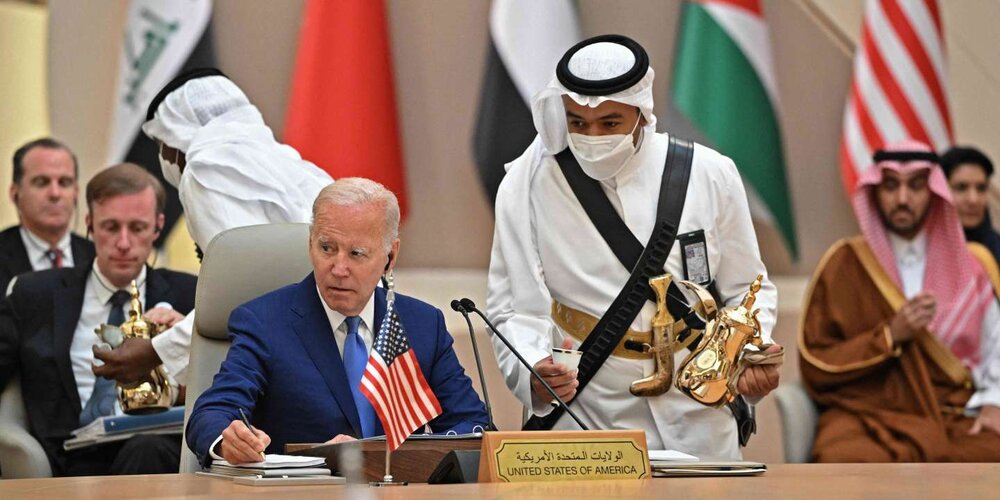Biden’s blackmailing brings Iran to nuclear threshold

TEHRAN — Although the Joint Comprehensive Plan of Action (JCPOA) is not officially dead yet, the internationally recognized agreement endorsed by the United Nations Security Council is now in a state of coma, chiefly due to the political confusion of U.S. President Joe Biden.
As the successor of a reckless president named Donald Trump who unilaterally withdrew from the JCPOA in May 2018, Biden pledged to return to the deal and built his elections campaign around it.
However, his willingness to compromise has led to a current state of coma for the 2015 nuclear deal, and this has caused Tehran to shift tones.
In an interview with Al Jazeera aired on July 18, Kamal Kharrazi, head of Iran’s Strategic Council on Foreign Relations, said, “It should be noted that Iran is on the nuclear threshold and this is not something secret.”
He added “Iran has the capability to build nuclear bomb but it has no decision” to do so.
The remarks by Kharrazi sparked various reactions from political analysts all around the world, but it meant one thing: he made it clear that Iran is preparing a credible response to a possible Israeli aggression.
Kharrazi is usually reticent and cagey about Iran’s foreign policy. And when he speaks, he chooses his words carefully and in a measured way. However, the same position was uttered by Iran’s nuclear chief, Mohammad Eslami.
Speaking on Monday, Eslami said, “As Mr. Kharrazi stated, Iran has the technical ability to build a nuclear bomb, but this is not on the agenda.”
However, he added, the important point is that the Israeli regime has made numerous false accusations and fabrications to deceive the public.
“The public is being raised with the support of the opposition front of the Islamic Revolution. They may create problems for Iran, but they will not achieve their desired results, as Iran has found its way and is moving forward with its plans,” he elaborated.
Eslami also noted that all of Iran’s nuclear activities are being carried out under the supervision of the International Atomic Energy Agency in line with the NPT and the Safeguards agreement.
“The philosophy of the JCPOA was to answer all the illusory questions attributed to the Islamic Republic of Iran. Therefore, in the JCPOA, it was agreed that Iran would limit its capacity and accept strict monitoring of its nuclear activities in order to eliminate these false accusations,” he noted, asking the West that if it wants to return to the deal, do it quickly and stop wasting everybody’s time.
Iran is now closer than ever to obtaining a nuclear bomb, past the point where assassinations, sabotage, or even an airstrike blitz might meaningfully impede its nuclear capability.
In an article published in The Intercept, Hussain Murtaza, a prominent journalist, wrote, “Iran’s path to the bomb is of course of its own making, but it has been helped along the way by Biden’s stubborn refusal to make the compromises necessary to revive the 2015 nuclear deal. Biden’s predecessor Donald Trump withdrew from the deal in a fit of pique, and Biden campaigned on getting back in. When push came to shove, however, Biden refused to undo Trump’s aggressive measures.”
Murtaza labeled the current status of the JCPOA “as a zombie,” as it’s neither dead nor alive.
“It’s hard to say that the nuclear deal is definitively finished because, in theory, both parties could miraculously come to terms at any time. It could be accurately described as a zombie: not quite dead, but not about to have life breathed back into it either,” he wrote.
Seemingly, Biden likes blackmailing Iran. Although Trump initiated the process that led to this point, it was Biden's combination of weakness and indecision that brought the JCPOA to its current dilemma.
“The U.S. is largely stuck now with a long-term mess of its own making. Negotiating with Iran was often depicted by U.S. leaders as doing a favor to the Islamic Republic.
The reality, though, was that the deal served legitimate U.S. interests: preventing nuclear proliferation, while sparing Americans from another armed conflict in the region,” The Intercept commented.
Lack of commitment, political will, and guts in the Biden administration has been detrimental not only to his future as a political leader, but also to Europeans and Americans in the midst of the energy crisis. Iran, with its enormous energy market, can be a solid partner for the Europeans throughout the upcoming frigid winter. Biden, on the other hand, selected a different route. Making amends with Saudi Arabia's Mohammad bin Salman, also known as MBS.
Nonetheless, the strategy did not go as planned. Biden never received a clear guarantee from the Saudis or the Emiratis to raise oil production, and MBS spoke on the phone with Vladimir Putin, Biden's nemesis. This may be taken as the cherry on top of Russia's ice cream sundae, indicating that Russia continues to sell more oil despite U.S. sanctions.
By returning to the 2015 nuclear deal, Biden could be delighted with just one achievement during his presidency before the Republicans possibly depose him in 2024. Having barely accomplished anything in domestic or foreign policy and dealing with angry Americans for a whopping increase in fuel prices, Biden needs to return to the JCPOA more than anyone.
The nuclear accord was the Obama administration's hallmark diplomatic achievement, with Biden serving as vice president. Biden had a substantial political opportunity upon taking office to bring the United States back into compliance with the deal, the minimal parameters of which the Iranians had maintained to uphold despite Trump's maximum pressure campaign.
Instead, perhaps fearful of upsetting his political opponents, Biden declined to immediately re-enter the agreement. Due to domestic political pressure coupled with indecision, Biden continued to play good cop bad cop rather than making a genuine effort to re-enter the deal. Now it appears that he has nothing to show for it.
Leave a Comment